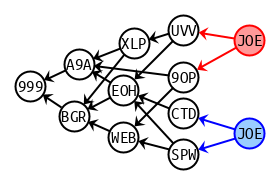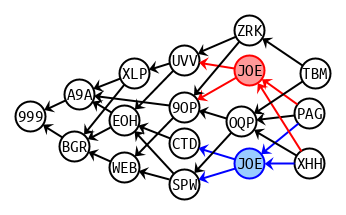This is releatedrelated/a follow up question to "https://iota.stackexchange.com/q/2038/10"
Imagine two transactions that hash to the same value but have different trunks and branches. Like this:

* I used "3 tryte hashes" without MWM instead of 81 tryte hashes for the sake of lucidity. For your answer, please just pretend they are 81 tryte hashes with default MWM.
I know, that it's very difficult to find a CURL-P/CURL collision.
- Is it difficult enough for this to actually NEVER happen, even if someone tries to make it happen?
Let's assume, someone managed to find two JOEs, and they also manage to publish them to different places in the network so that approximately half of all nodes get the red JOE and the other half get the blue JOE.
This also means that half of the network does not get to see blue JOE and the other half does not get to see red JOE.
- What would happen, if none of the
JOEs carry information like bundle signatures? i.e., they are just spam transaction; - What would happen, if one of the
JOEs carries a bundle signature (and the other one is just a spam transaction) or if they belong to two different bundles and both carry a signature for their bundle? The two bundles do not spend funds from the same address. - What would happen, if the
JOEs carry signatures for two different bundles that try to spend from the same address.
